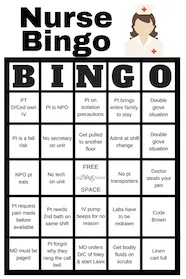When caring for those with dementia and other age-related issues, read this guide. These nursing care plans for the elderly are essential.
How do you care for the elderly as a nurse? Do you create specific nursing plans? There are so many things to think of and prepare for. I hope this guide gives you a few more ideas and ways you can help those that need it most. Whether you specialize in geriatric nursing or on a floor that sees a wide range of ages, this guide is for you.
Four Essential Nursing Care Plans For Elderly Patients
There are so many things you need to be prepared to respond to when you are caring for elderly patients. They are more susceptible to infection, falls, and are typically on more medications. These are the four most important nursing care plans that you need. As you gain more experience at your job, create your own plans too.
Risk For Infection
As people age, they are more prone to infections. In fact, these are the common risk factors for infections that you need to be aware of:
- Age-related changes
- Medications
- Slowed ciliary response
- Poor nutrition
After you identify the risk factors, write down (or just understand) the desired outcomes. The most obvious one is that the patient remains infection-free. You’ll be able to tell this by their body temperature, respiratory rate, and breathing patterns.
A lot of nursing interventions for risk of infection involve assessments. These are some of the most important ones:
- Monitor baseline vital signs. Record if they change and by how much. This includes heart rate and body temperature.
- Assess the patient’s skin. Look for cuts, lesions, breaks, ulcers, or tears.
If you notice signs of an infection, take some of these steps:
- Anticipate the need for blood cultures or urinalysis
- If an infection is proven, anticipate the use of IV fluid therapy
- Prepare for the request for white blood cell count
- Be prepared to give the patient broad-spectrum antibiotics
Risk For Falls Care Plan
Since elderly patients are often weaker and have frail bones and joints, they are at a higher risk of falls (and injuries from falling). As a nurse, you need to be prepared to closely monitor patients who have a higher risk for falls than normal. These are the fall risk factors you need to be aware of:
- Malnutrtion
- Sleeplessness
- Confusion
- Skin breakdown
- Disorientation
- Impaired balance
- Hearing difficulties
- Altered mobility
The desired outcomes are to prevent all falls – if possible. It’s also to prevent any fall-related injuries. This care plan is all about prevention and creating a safe place for elderly patients.
These are the nursing interventions that should be on your care plan:
- Assess the patient and take note of any conditions that put them at a greater risk for falls
- Look at the environment around the patient for anything that could pose a risk for injury or falls
- Create a safe and stable environment for the patient
- Make the area safe by keeping the lights on at night.
- Keep the patient’s bed at the lowest position and use side rails when needed
- Teach unstable patients how to use adaptive devices like canes or walkers
Nursing Diagnosis (And Care Plan) For Dementia
Also called disturbed thought patterns, confusion is a risk factor for dementia. There are lots of things that put elderly patients at a higher risk for memory or cognitive impairment. It isn’t always dementia. Some of the things that cause disorientation or confusion in elderly patients are:
- Hypoxia
- Head Injuries
- Medications
- Infection
- Malnutrition
- Depression
The desired outcomes for these patients includes:
- Participates in activities
- Maintains proper orientation to time and place
- Remains safe from injury
- Recognizes changes in behavior
If you notice an elderly patient is disoriented or confused, these are the interventions you should prepare for:
- Assess the patient’s attention span and their ability to make decisions
- Identify factors that put them at a higher risk for disturbed thought processes – this can help determine causative factors.
- Frequently assess their neurologic status
- Orient patient to reality when needed
- Keep items in the same places in order to minimize confusion
- Protect the patient from sensory overload
- Encourage memories and discuss past events
- Plan a routine for the patient and follow it as consistently as possible.
Final Thoughts
Caring for elderly patients requires close supervision and frequent assessments. Make sure you have nursing care plans that you can follow in the event that your patient has one of the risks mentioned in this guide.
More Nursing Resources
As you continue to care for patients as a nurse, here are some more resources that will give you the knowledge (and tips) that you need.
Download Nurse Bingo Today!

Liven up any shift with a fun game of bingo. See who can fill a row first!
Fill a whole card and lose grip with reality.
Your privacy is protected. We will never spam you.




